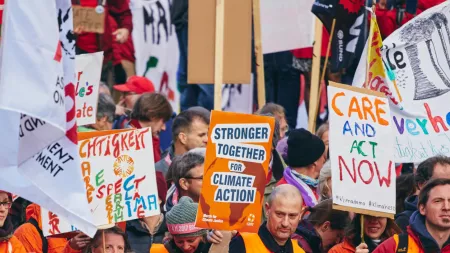New research commissioned by CARE International exposes a woeful track record of rich countries pledging climate finance that does not translate to new and additional funding for the poorest countries. This includes the £290 million climate finance pledge announced today by the UK government, which is not new and additional to existing Official Development Assistance commitments.
The research assesses how much of the $29 billion of Official Development Assistance (ODA) reported as climate finance by rich countries in 2018 can be considered as “new and additional,” and the results do not bode well for meaningful climate finance coming out of COP26.
Using two definitions of additionality presented in the UNFCCC Biennial Assessment (UNFCCC, 2016), CARE finds that the majority of climate finance is simply ODA being rebadged with a climate objective, meaning it does not represent the “progression beyond previous efforts” from rich countries demanded in the Paris Agreement. Rather, the funding is taken from money already earmarked for aid intended to tackle poverty, hunger and inequality in the poorest countries. Huge amounts of that same finance is then repurposed in rich countries’ accounting as also in support of the $100 billion target: Most of the finance is not new money.
The figures are shocking. Only 6 per cent of the finance can be considered as additional to the pledge to provide 0.7% of their Gross National Income (GNI) as ODA.
And less than half (46 per cent) of the climate finance contributed in 2018 is found to be additional to a baseline of the ODA disbursed by rich countries in 2009 before the $100 billion target was agreed.
The report notes that there is no universal agreement on how additionality of funds is measured – a loophole which enables countries to use toothless definitions, allowing all of their finance to be reported, misleadingly, as new and additional.
CARE’s John Nordbo, senior advocacy advisor on climate, said, “In short, the poorest countries are not only bearing the worst impacts of the climate crisis, they’re also footing the bill. When leaders stand in front of the world’s media and pledge billions to tackle the climate crisis, not enough scrutiny is applied to examine whether this money will indeed help the poorest countries to tackle the causes and impacts of a rapidly changing climate. If assistance is coming at the cost of their health, education and food security then it is, quite simply, not assistance – it’s smoke and mirrors.”
Signs point to little improvement going forward: on day 2 of COP26, Prime Minister of the UK and COP26 host country, Boris Johnson, announced a £1 billion of climate funding that is set to come out of the UK’s future aid budget, and therefore come at direct cost to the poorest countries.
Development and climate activities require substantially increased funding. Just as climate change adds additional costs to development agendas in the global South, the financial contributions of rich countries towards climate change must be additional to their support for development. Failure to provide new and additional climate finance directly threatens the amounts and efficacy of the finance to be spent on poverty reduction and responses to climate change.
Nordbo said, “Our leaders are effectively robbing the poor to give to the poor. We are now at 'last chance saloon' to borrow from Prince Charles’s COP26 speech. We should have long since risen above political spin towards meaningful action to avoid the worse of the climate catastrophe, which is almost entirely the making of the richest countries. We have to stop ripping off the poor. Financial sleight of hand will not save our children’s futures, and it will not save our planet.”
Read the full research paper here
CARE’s COP demands in a nutshell:
Finance for climate justice
At the very least, wealthy countries have to deliver on their decade-old pledge of $100 billion annually, with 50% going to adaptation.
Stay within a global temperature increase of 1.5°C
Shift to net zero emissions as soon as possible in line with the 1.5°C limit of the Paris Agreement.
Gender Justice
Increase efforts to integrate gender equality across all climate measures and send funding to local women-led and women’s rights organisations working to tackle climate change.
Gender-transformative adaptation
Invest technical and financial support to accelerate gender-transformative climate action and decision-making. These are projects that support people in adapting to climate change that also work towards empowering women and girls and upholding their rights. This should include promoting women’s and girls’ leadership in climate action.
Tackle climate loss and damage
Many countries and communities have already experienced irreversible devastation due to the climate crisis, or will do in the future. COP26 must advance progress to provide finance to address these impacts.
